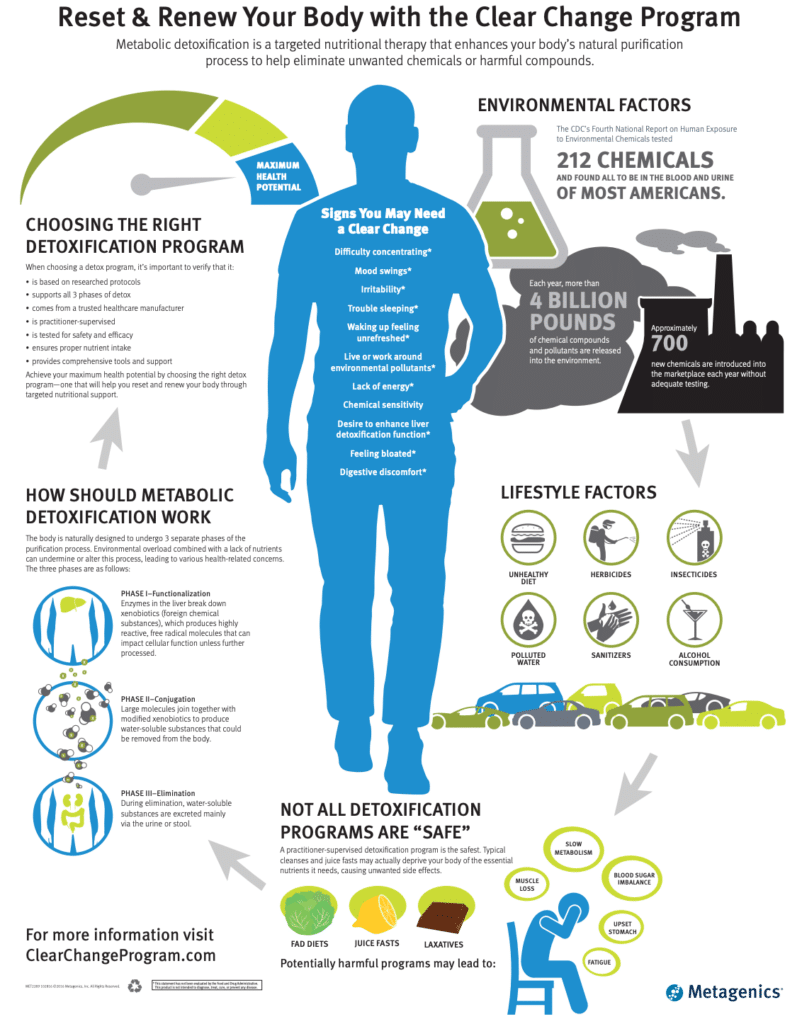We have all heard of detox diets and their supposed magical benefits.
But do detox diets work?
The answer to that is, “It depends.”
The most typical type of detox program these days involves a period of fasting and then a strict diet usually involving veggie juice, smoothies, water, and herbal teas.
Often a detox will require the elimination of various “toxic” elements such as alcohol, coffee, red meat, grains, refined sugar, etc.
And you may also be asked to exercise heavily, do saunas, drink large amounts of water, do enemas, and other methods of facilitating the removal of toxins from the body.
Although there is some evidence that these types of diets can help remove some toxins from the body (1), we should also keep in mind that our bodies are perfectly designed to be “detoxifying” all the time. (2)
But I believe it is important for all of us living in a world full of toxic exposures to be aware that our bodies are overloaded and our natural detox mechanisms cannot keep up.
Therefore, I am a proponent of doing a detox that includes some of the dietary features listed above AND taking supplements to boost the body’s natural detox systems.

What is a healthy detox?
There are countless ways that our bodies are naturally eliminating toxins that range from cellular waste and hormonal and neurotransmitter byproducts to alcohol and PCBs and heavy metals in our food.
Healthy cells have various mechanisms in place and they send the waste into the blood to be processed and removed.
Our liver and kidneys often bear the brunt of cellular waste.
There are also other ways that the body excretes toxins such as through the skin and lungs.
But the liver plays a major role in what we think of as “detox”.
Within the liver, we have what is called Phase 1 and Phase 2 detoxification.
In Phase 1, harmful substances are broken down but they often create even more damaging molecules in the process.
One way to support phase 1 detox is to avoid taking in harmful substances such as alcohol, refined sugars, and chemicals in our food.
Another way to support phase 1 is to increase the intake of helpful nutrients such as antioxidants, B vitamins, minerals, and polyphenols.
Fasting does not “slow down” phase 1 activity.
It’s important to note that it can be dangerous to stimulate phase 1 detox if you don’t also support phase 2.

This is why some people feel terrible when they fast. The activity of Phase 1 is still robust but because the nutrition needed to support Phase 2 is lacking, the toxins build up.
As a matter of fact, if you don’t support Phase 2, you can end up feeling awful because the byproducts of Phase 1 are often more damaging than the original toxin!
Phase 2 is supported by specific amino acids, B vitamins, glutathione, cruciferous vegetables, and minerals.
There are many enzymes involved in these phases. And they are all supported by our nutrition.
That is why when we want to clean out our system it is best to use supplements to support these processes.
Then there is Phase 3, which takes place in the GI tract and involves the elimination of the byproducts of Phase 2.
Phase 3 elimination is supported with fiber and water and healthy gastrointestinal function.
The major takeaway here is that it’s not enough to just fast and drink veggie juice and tea.
Detox diets only work when they are done using the right tools. (3)

Should you do a detox?
Here is a list of signs that indicate you may benefit from a well-planned, science-backed detox program.
- Difficulty concentrating
- Mood swings
- Irritability
- Trouble sleeping
- Waking up feeling unrefreshed
- Lack of energy
- Feeling bloated
- Weight gain or difficulty losing weight
- Digestive discomfort
- Chemical sensitivity
- Exposure to toxins
- Feeling like you need a reset
Also, keep in mind that if you take multiple medications, have any serious medical conditions, severe digestive disorders, an eating disorder, chronic constipation, or any other medical concerns, you should definitely consult with your doctor before starting any kind of detox program.
In my clinical experience, I have found that most people that are relatively healthy reap huge rewards from doing a well-designed detox.
These benefits include:
- Increased energy
- Better mental focus
- Improved cognition
- Better sleep
- Feeling lighter
- Weight loss
- Less bloating
- Better GI function
If this sounds like something you would like to explore more, click below to learn about our upcoming group program, which is a 10-Day Metabolic Detox by Metagenics.
- Cline JC. Nutritional aspects of detoxification in clinical practice. Altern Ther Health Med. 2015 May-Jun;21(3):54-62. PMID: 26026145.
- Genuis SJ, Birkholz D, Rodushkin I, Beesoon S. Blood, urine, and sweat (BUS) study: monitoring and elimination of bioaccumulated toxic elements. Arch Environ Contam Toxicol. 2011 Aug;61(2):344-57. doi: 10.1007/s00244-010-9611-5. Epub 2010 Nov 6. PMID: 21057782.
- Liska D, Lyon M, Jones DS. Detoxification and biotransformational imbalances. Explore (NY). 2006 Mar;2(2):122-40. doi: 10.1016/j.explore.2005.12.009. PMID: 16781626.
